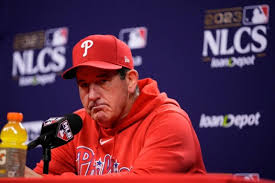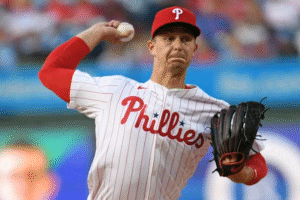
As the 2025 Major League Baseball season approaches its midpoint, the Philadelphia Phillies find themselves in a competitive battle for postseason positioning in the National League. The team has performed strongly through the early months of the season and currently holds a narrow advantage in the National League Wild Card race. They are also within striking distance of the division-leading New York Mets in the NL East. This competitive standing, coupled with the team’s high expectations, has made it clear that the Phillies intend to be aggressive as the July 31 MLB trade deadline approaches.

Front office executives are reportedly focused on addressing several roster needs that have emerged over the first half of the season. Specifically, the Phillies are believed to be targeting upgrades in the bullpen as well as in the outfield. Two players frequently linked to Philadelphia in trade rumors are Baltimore Orioles center fielder Cedric Mullins and their elite closer, Félix Bautista. These two impact players represent potential solutions to the Phillies’ most pressing needs, but acquiring either would come at a steep price. Fortunately, the Phillies possess a valuable asset that may help facilitate such a high-stakes trade — their depth of starting pitching, both at the major and minor league levels.
The Mick Abel Factor: Rising Prospect Stock Draws Interest
One name that continues to surface in trade discussions is Mick Abel, the Phillies’ highly touted right-handed pitching prospect. Abel has long been regarded as one of the most promising arms in the Phillies’ farm system, but it’s his recent emergence on the major league stage that has brought his name to the forefront of trade speculation. After a disappointing and inconsistent 2024 season in the minors, Abel has rebounded in impressive fashion this year, showcasing growth in his command and poise on the mound.
Abel’s early major league numbers reflect this upward trajectory. In his first three starts with the Phillies, he has posted an impressive 2.35 ERA, striking out 14 batters in just over 15 innings. This strong showing has not gone unnoticed. According to Matt Gelb of The Athletic, Abel’s recent performance and improved pitch control have significantly increased his value in the eyes of other teams. “This qualifies as a good problem for the Phillies to solve,” Gelb noted, adding that Abel’s ability to confidently throw strikes and challenge hitters has made him a very attractive potential trade piece.
This transformation has placed the Phillies in a delicate position. On the one hand, they have a young, controllable starting pitcher who could grow into a long-term rotation piece. On the other, they are a win-now team that may be one or two key acquisitions away from being serious World Series contenders. That kind of short-term urgency might prompt the front office to leverage Abel’s rising stock in pursuit of veteran contributors who can make an immediate impact down the stretch.
Philadelphia’s Pitching Depth and the Trade Deadline Dilemma
In a scenario where the Phillies decide to move a top prospect like Abel, it’s worth considering the composition of the team’s pitching staff, both now and in the years to come. As Gelb points out, even if Abel remains in the organization, he may not be a primary part of the team’s rotation plans for the 2026 season. The Phillies already have three established starters under contract: Zack Wheeler, Cristopher Sánchez, and Aaron Nola. Additionally, young talents like Jesús Luzardo and Andrew Painter are under club control and expected to play significant roles in the near future.
Given this anticipated surplus of starting pitchers, the Phillies could afford to part with Abel in the right deal — particularly if the trade helps address current weaknesses in the bullpen or the outfield. This is the type of “good problem” that contenders often face: choosing between nurturing young talent for the future or dealing it to reinforce a roster built to win now. In many cases, contending teams choose the latter, especially when they are on the cusp of a playoff berth or a deep October run.
Still, there are complicating factors. One key issue is the health status of ace Aaron Nola. Nola is currently recovering from an injury, and his availability in the coming weeks could directly influence whether the Phillies are comfortable parting with Abel. If Nola’s return is delayed or uncertain, the front office may be hesitant to trade away a starter, even one as young and unproven as Abel. But if Nola can return to form before the deadline, the organization may have the confidence to pursue high-impact trades involving their young pitchers.
Baltimore Orioles as a Potential Trade Partner
Among the most frequently mentioned potential trade partners for the Phillies are the Baltimore Orioles, a team that has emerged as a contender in the American League. Baltimore boasts one of the most dangerous lineups in baseball, but their need for quality starting pitching is well-documented. With a farm system rich in position player talent but light on elite arms, the Orioles are seen as a natural trade partner for a team like the Phillies, who can offer exactly what Baltimore needs.
If Philadelphia is truly willing to make Abel available, it could open the door to acquiring players like Cedric Mullins, Félix Bautista, or even slugging first baseman Ryan O’Hearn. Mullins would offer the Phillies a proven center fielder with strong defensive skills and above-average speed, while Bautista — one of the best closers in the game — would dramatically improve a bullpen that has lacked consistency. O’Hearn, meanwhile, could add a left-handed power bat and provide versatility at first base and designated hitter.
All three of these players would address key areas of need for the Phillies. In that context, the idea of parting with Abel becomes less about sacrificing the future and more about maximizing the present. If the organization is serious about contending for a championship in 2025, then leveraging their surplus of pitching talent — and specifically, the rising value of Mick Abel — may be a risk worth taking.
The Risk-Reward Equation of Trading Prospects
Of course, trading a young pitcher like Abel comes with inherent risk. Prospects, particularly pitching prospects, are difficult to evaluate and can often take several years to develop. By trading Abel, the Phillies could be giving up a future All-Star or even a front-line starter. On the other hand, prospects are not guarantees — and if Philadelphia believes that their current roster has a real chance to compete for a title, holding onto Abel could represent a missed opportunity.
Teams in the Phillies’ position often face this kind of dilemma. Front offices must weigh the uncertain value of a prospect’s future against the more tangible benefits of acquiring proven major league talent. For the Phillies, this calculus becomes even more nuanced given the context of their division race, their injuries, and the state of their farm system. Trading Abel would not be an easy decision — nor would it be a reckless one. It would be a calculated move aimed at capitalizing on a championship window that may not stay open for long.
Conclusion: A Pivotal Deadline Awaits
As the July 31 trade deadline approaches, the Philadelphia Phillies will be forced to make some of their most important decisions of the season. Whether or not they decide to move Mick Abel could define not just their playoff chances this year, but the long-term direction of the franchise. Abel has shown flashes of brilliance and represents a high-upside arm with considerable value around the league. However, his place within the Phillies’ rotation plans remains uncertain due to the presence of established and emerging starters.
The decision to trade Abel would signal that the Phillies are fully committed to chasing a title in 2025, even if it means parting with a potential future star. If Baltimore, or another contender in need of pitching, is willing to part with premium talent in exchange, the Phillies would be wise to listen. For a team so close to the top of the National League, the time to push their chips in may be now — and Mick Abel could very well be the most valuable chip on the table.
Leave a Reply